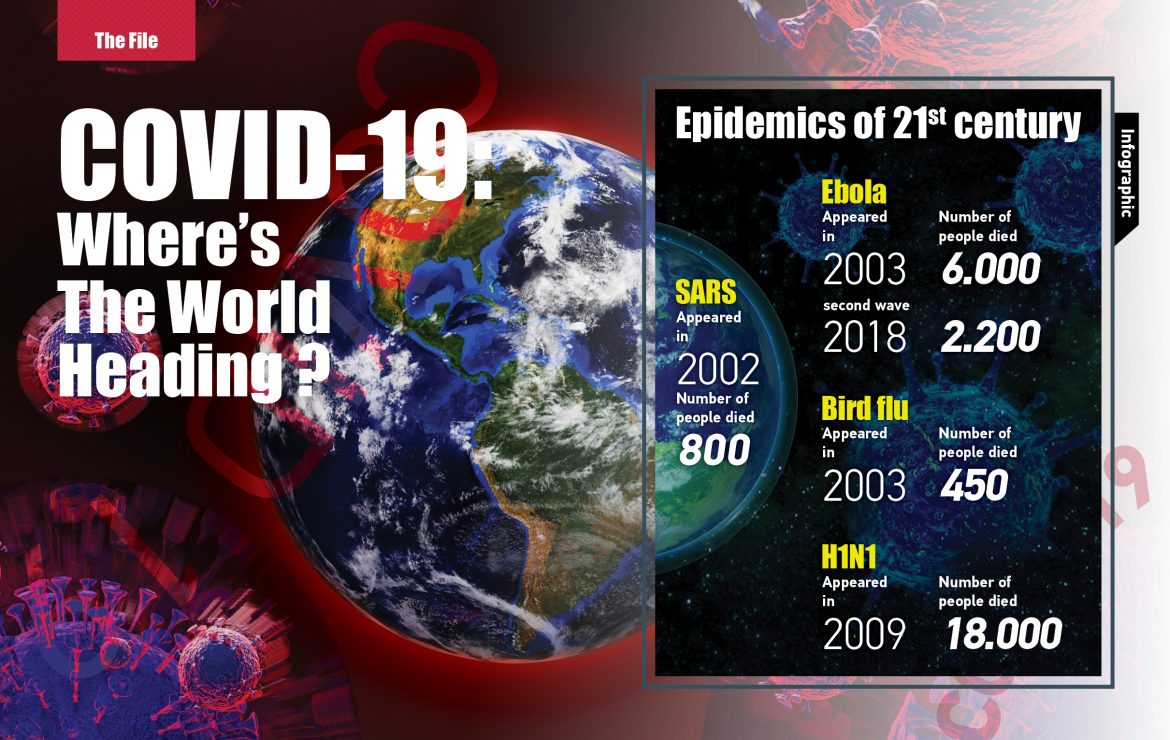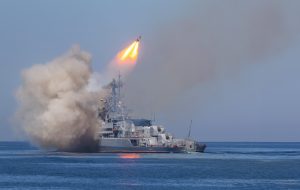The novel coronavirus outbreak in China’s Wuhan at the end of December 2019 and rapid global spread across and threw the world into the abyss of what was dubbed as the worst-ever crisis since World War II. Numerous studies and views argue that this crisis may be a turning point for the world order. The “Post-Corona World” has come to gain currency on a wide-scale.
The epidemic, which left behind ongoing life-threatening implications on humanitarian, health, economic and strategic levels, dealt a severe shock to the current world order, laid bare many inherent shortcomings and rekindled discussions on the concepts and tenets of this order over the recent decades such as globalization, sovereignty, nation-state’s role, regional and international integration, governance, etc. Serious questions were invited regarding the future of the international liberal system, world powers’ equilibrium in the foreseeable future, and patterns of cooperation and struggle relationships at the regional and international levels, let alone at the domestic level; in some nations and communities, concepts of national and international security and economic development which may as well be disbanded and reconstructed.
Why Coronavirus Epidemic is a Turning Point for the Whole World
The novel coronavirus epidemic has a set of general characteristics that makes it different from other crises in the past few decades, and tempts researchers and specialists to consider the epidemic a turning crucial point for the current world order:
1 World rapid, wide-scale outbreak (Globalized pandemic): Unlike the other limited, slow-going and fewer losses world epidemics in the last few decades, COVID-19’s rapid and widespread outbreak was a main characteristic and one of the gravest sources of danger – a fact driven home by figures and statistics. The 2003 left only 450 people dead, whereas the 2002-2003 SARS infected more than 8000 people of whom only 800 died worldwide. Swine flu virus (H1N1) which was discovered in 2009 claimed 18,000 lives by the end of 2010 according to WHO statistics, while West Africa Ebola claimed 6,000 lives in 2013 and more than 2,200 in a second wave in 2018.
These canno5 be compared to COVID-19 either in terms of deaths, infections, spreading throughout most world countries, rendering international travel routes and economic movement paralyzed and sending 50% of mankind into lockout. Even heads of state and prime ministers were not spared.
The rapid widespread of this epidemic is attributed to two reasons: First, Globalization and modern technology in communications and means of transport made cross-border movement much quicker and easier which helped spread any pandemic across the world quickly as the case with COVID-19 in which was termed “globalization of epidemics” – a negative outcome of globalization – that made globalization a controversial issue and questioned its significance. Second, it has to do with the center of pandemic; namely China which keeps vast relations with almost every world country and enjoys vast economic relations as the world’s second largest economy, largest provider of commodity, and has one fifth of world population.
2 Crisis is Comprehensive, Diversified and Multi-dimensional: Losses, however big, were not only human and health-related but also economic, political, social, strategic and security-related, which makes this crisis different from previous crises and from the 2008 world economic crisis the consequences of which were basically economic.
3 The crisis erupted basically in the Big Powers in control of the world order, notably China, Europe and the US as top players of the current world order. So, the repercussions will leave unmistakable impact on world power balance in future. Also, how these powers will handle the crisis will indicate how powerful and elastic they are when tackling crucial world challenges – a powerful indicator to study world power equilibrium at present and in future.
4 Suddenness of the Crisis: It is not that the crisis came unannounced but it is the scale and swiftness of the pandemic. Even the most advanced nations were caught by surprise and were, apparently, not prepared to handle the consequences and bring the crisis under control, especially health-wise. Medical and health resources proved short and inadequate in many countries who could not take the load of so many infections, thus triggering a huge crisis in nations’ ability to accommodate and offer adequate health care to so many victims
Coronavirus—Heavy, Wide-scale Regional and International Implications
The novel COVID-19 outbreak was anything but a passing event like previous epidemics that have stricken the world over the past decades. The impact and deep changes this pandemic brought at the political, economic, security and community levels were striking enough to prompt many researchers, experts and even politicians to anticipate a complete makeover in the world landscape. The most important implications can be summed as follows:
Economic Implications:
The novel COVID-19 outbreak had a direct toll on the world economy which embarked on a crisis deemed by many, including the International Monetary Fund (IMF) and German Chancellor Angela Merkel, worse than the 2008 financial and economic crisis. Others drove analogy to the 1929 Great Depression that paralyzed the world economy. With most world countries closing their borders, travelling movement almost coming to a stop, many factories, enterprises and service sectors shut down, half world population placed under quarantine and restrictive and precautionary means put in place in a bid to control coronavirus, the world economy received a severe blow that brought it to -to quote IMF Director, Kristalina Ivanova Georgieva on 27 March 2020 – the worst-ever recession in the past few decades.
Estimates on the decline of world economy growth varied immeasurably citing the uncertainty about the progress of the pandemic. In a 22 March 2020 report Standard & Poors (S&P) forecast a 1-1.5% decline in world GDP in 2020, with further risks expected. Bloomberg experts expected 2020 to be the worst since the 2009 world recession and estimated that world GDP will lose $2.7 billion by year end, assuming the world economy is able to come back by 4th quarter. If not, the situation will be much worse, they figured out. IMF global economy growth forecasts saw several adjustments before IMF Director declared officially at the end of March that the global economy was entering recession. She maintained that IMF estimates of “total financial requirements of the emerging markets amounted to %2.5 trillion”, and that more than 80 countries have actually requested an IMF emergency assistance to counter coronavirus implications.
Similarly, the World Trade Organization (WTO) recorded acute decline in world trade this year that may amount to 13-32%, and expected impact on trade to exceed 2009 world financial crisis recession which may amount to the 1929 Great Depression – worst-case scenario.
World Trade Volume Development
World Finance Institute (WFI) forecast a decline in total global GDP to just 1%- the lowest since the global financial crisis- which is far less than 2.6% growth rate in 2019, while the Organization of Cooperation and Development (OCD), which represents the 36 top world economies, forecast the 2020 total global GDP to decrease to 1.5% thid year—half the 2.9% rate expected before the coronavirus outbreak.
Fears of the coronavirus outbreak have driven investors to hike bonds rate, which led revenues of macro-economies to go down and use secure assets like gold which shot high. Declining world economic activity lowered demand for oil and pushed down oil prices to the lowest levels in years which maximized differences about oil production cuts between OPEC and allies.
These catastrophic economic implications resulted in losing millions of jobs and a record rise in unemployment rates. ILO expected in mid-March 2020 that the pandemic will lead to losing 25 million jobs worldwide but later on 8 April 2020 re-adjusted the figure to195 million full-time jobs worldwide.
The coronavirus pandemic has worsened the catastrophic consequences on global economy:
Political and Strategic
Implications:
The COVID-19 pandemic crisis has laid bare irregularities, not only in the current world order structure but also at the national and regional levels:
(A) National Level:
This crisis has laid bare the grave irregularities in health, economic and political governance in many world countries, including the rich and advanced Big Powers such as the US, Britain, Italy, France, Spain and others which- unable to deal with a crisis that big- stood handcuffed and unable to tackle the large numbers of infections.
• The crisis will have far-reaching consequences on the future of many governments and political systems depending on failure – or success- in dealing with the crisis. Many have discussed how the crisis can affect the US President Donald Trump’s future in the forthcoming elections.
• The crisis gave the nations with political crises a chance to put their crises on hold or settle them. One good example is the Saudi-led Yemen Arab Coalition’s announcement on 9 April 2020 of a two-week unilateral ceasefire.
• This crisis has maximized the danger of western extremists who took advantage of this incident to boost their agenda calling for introversion and anti-immigrant policies. The fundamentalist religious organizations in the Arab and Muslim worlds seized the opportunity to regain control and secure more recruits by claiming that the coronavirus is a heavenly curse for shunning faith and fighting “believers”.
• The crisis re-emphasized the significance of the community in the domestic policies, as governments how vital it is to increase public awareness and follow measures outlined by the various authorities.
(B) The Regional Level
The COVID-19 pandemic has exposed the absence of team-work in the regional organizations vis-à-vis the coronavirus. A case in point is the European Union whose members suffered unmistakable tensions and balked at any move to assist the worst-hit nations. Italy’s Prime Minister Joseppi Conti warned on 29 March 2020 that the EU may “lose its raison d’etre” unless it stands up to the coronavirus challenge. He warned on 9 April 2020 that the EU may risk, as a project, failure as a result of coronavirus outbreak.
Italy’s public opinion resented the EU behavior vis-à-vis the coronavirus outbreak, and the Italian Ambassador to the EU noted on 23 March that the EU should not leave Italy alone in the refugees’ crisis. The mass media aired photographs of Italians lowering the EU flag and raising the Chinese flag instead after Beijing has offered Rome some assistance.
Similarly, Austria Prime Minister Sebastian Cruz pointed out that “The principle of solidarity is not working in Europe vis-à-vis this grace situation”, while Czech Prime Minister Andrej Babis, whose country hastened to close borders with 15 countries, affirmed that “The European countries failed to coordinate the situation among themselves”.
(C) International Level:
The COVID-19 resulted in a number of grave consequences, notably:
• International Solidarity Is a Myth: The crisis revealed the absence of international collective solidarity as a concept and the egocentric approach of the Big Powers, especially the US which failed to assist even the European allies. Rather, it closed borders with them. More and above, a number of world powers, including the Big Powers, engaged in turf battles – such as US – China gripes and grudges- which raised suspicions on how serious their cooperation is to counter the novel COVID-19 outbreak. The US President Trump used “China Virus” to describe COVID-19 virus, which angered China. Moreover, the China Foreign Ministry Spokesman, Chao Lee Hiang, hinted that the virus was brought to Wuhan by the US.
• Powerful China: China successfully used strict measures to bring the crisis under control and reduce human losses considerably. More and above, Beijing offered assistance to many world countries, with the US included, to counter the pandemic. On 17 March US media published that a giant Chinese company planned to sell 1.5 million face masks to the US and that China shipped similar medical assistance to Japan, South Korea, Iran, Italy and Spain. On 19 March France received from China one million masks, 1.5 million gloves and 10,000 hazmat suits for doctors and paramedics.
These steps proved, not only that China is a major power capable of dealing with serious crises, but also consolidated Beijing international relations. The French Foreign Minister thanks the Chinese government for this support and for solidarity with the French people. Italy followed suit raising the Chinese flag atop EU institutions. Ursula von der Leyen, EU Commissioner President, tweeted on 18 March expressing deepest appreciated of the Chinese support: “I talked with China’s Prime Minister Li Kqiang who announced that Beijing will offer 2 million surgical masks, 200,000 N95 masks and 50,000 testing devices. In January it helped the EU by donating 50 tons of equipment, and we are grateful today for China’s support. We need each other in time of need.”
• Globalization is Fragile: the novel coronavirus was a crucial test to fragile globalization. With supply chains crumbling, nations rushing to hoard medical supplies and bringing travel movement under control, many thinkers, researchers and even politicians began to question globalization: Not only did it help spread contagious diseases but also consolidated the deep connection between corporations and states, thus making them more liable to receive unexpected shocks.
Nation-state Re-instated
• The coronavirus crisis has greatly helped rehabilitate the nation-state after long year of banishment. With the dismal failure to confront the pandemic, the collapse of health care systems and the economic recession worsening, the nation-state concept regained ground. Trump employed World War II-era emergency laws to force industrial giants like General Motors and 3M to produce respiratory systems and face masks respectively.
Security and Military Implications:
The COVID-19 pandemic revealed many security loopholes at the national and international levels:
• National Security Policies Reviewed: The coronavirus proved the governments wrong in their appreciation of the real threats to national security. Government focused on security as a military concept and hence rushed to stockpile arms, shooting global military expenditures in 2018 to $1.8 trillion.
• Security Threat: The consequence of the COVID-19 pandemic proved a credible threat to multi-tier security.
• National Security Reconsidered: The crisis proved the need is dire for reconsidering the national security system in its entirety( individual, community and state) with health security as top priority.
• National Army’s Role Consolidated: This role should be reconsidered to cope with crises and hard times.
• Cyber Security: More attention should be paid to cyber security, considering steady dependence on automation and the internet to operate health systems, e-trade and bank transactions.













